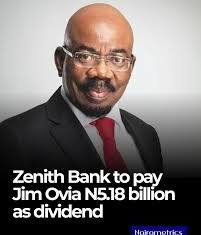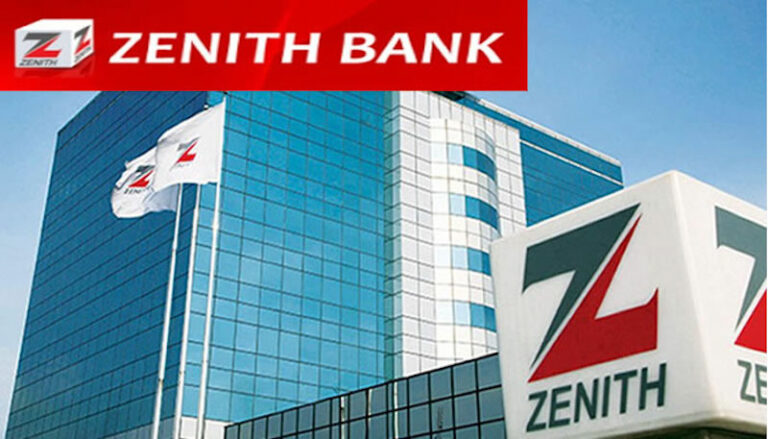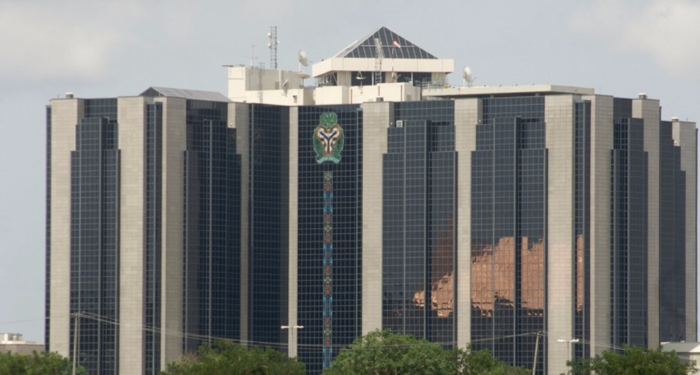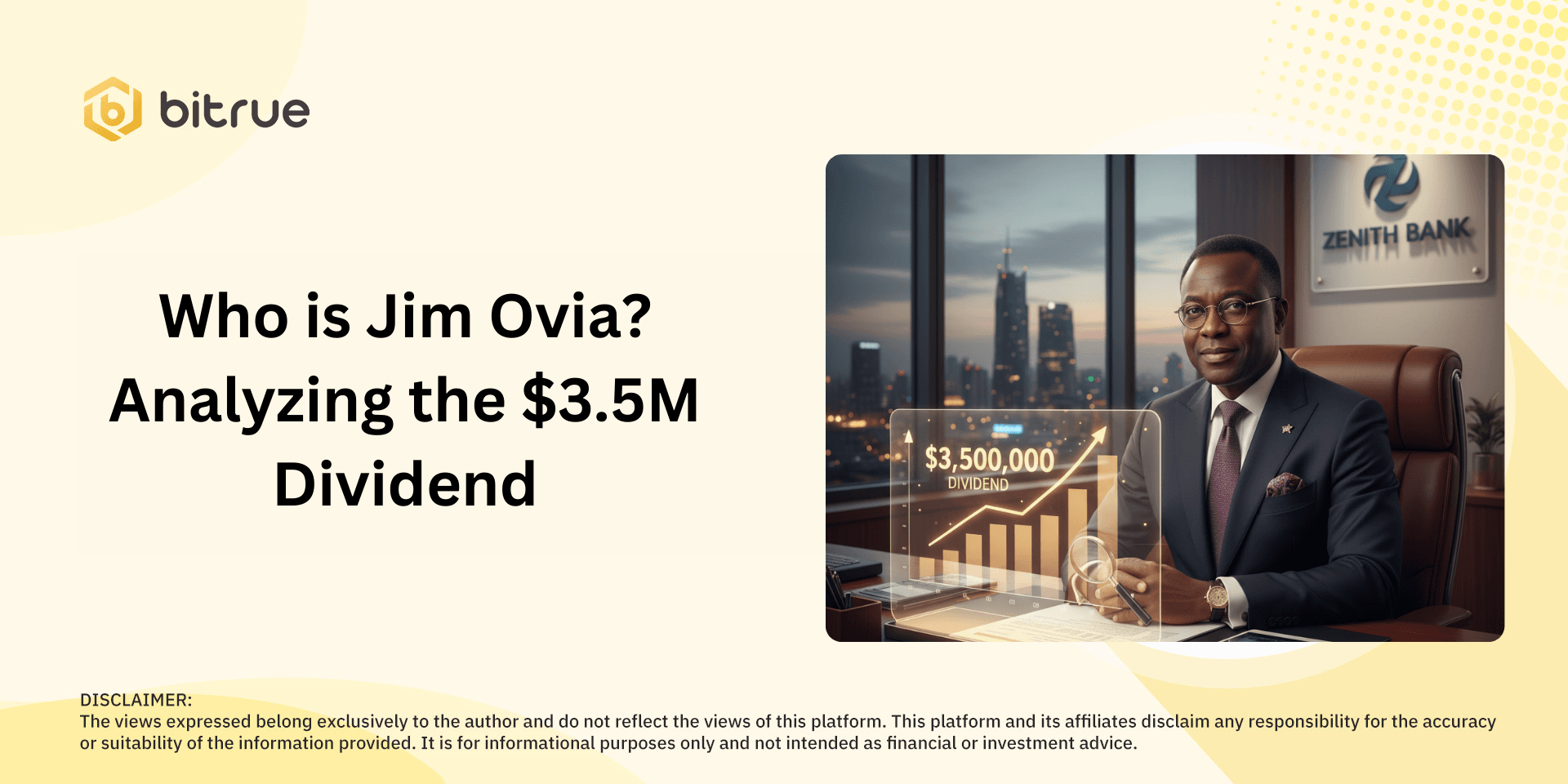
Who is Jim Ovia? Analyzing the $3.5M Dividend from Zenith Bank
- Business
- 24.09.2025
- No Comment
- 21
Who is Jim Ovia? Analyzing the $3.5M Dividend from Zenith Bank
Discover how Jim Ovia, the founder and chairman of Zenith Bank, earned a $3.5 million dividend payout in 2025 and what it means for investors.
Jim Ovia: Nigeria’s Banking Pioneer
Jim Ovia is one of Nigeria’s most prominent entrepreneurs and a major force in the financial sector. He founded Zenith Bank in 1990 and transformed it from a modest operation into one of Africa’s largest commercial banks. His vision, innovation, and commitment to sound corporate governance have made him a billionaire and a household name in Nigeria’s banking industry.
As chairman of Zenith Bank since 2010, Ovia continues to shape its long-term growth strategy while also pursuing interests in real estate, telecommunications, and technology. His influence stretches beyond banking, making him a key figure in Nigeria’s private sector development.
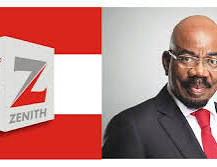
The $3.5 Million Dividend Explained
In 2025, Zenith Bank announced a substantial interim dividend that would see Jim Ovia pocket around N5.18 billion (about $3.5 million) from his direct stake alone. This payout highlights both the strength of Zenith Bank’s operations and Ovia’s ability to benefit from consistent profitability.
With 4.14 billion shares directly held, Ovia received an interim dividend of N1.25 per share, representing a 25% increase from last year’s N1.00 per share. When his 1.65 billion indirect shares are included, his total dividend income grows by another N2.06 billion, underscoring just how valuable his stake is.
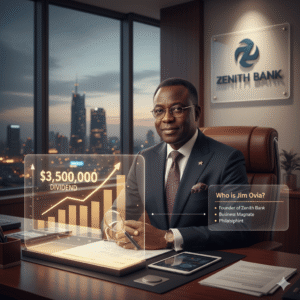
Zenith Bank’s Financial Performance in 2025
Despite a slight dip in pre-tax profit, Zenith Bank continues to demonstrate resilience and strength. For the half-year ended June 30, 2025, the bank reported:
- Gross earnings: N2.5 trillion (20% growth year-on-year)
- Profit after tax: N532 billion
- Profit before tax: N625 billion (down 13.95% from 2024)
- Non-performing loan ratio: 3.1%
- Liquidity ratio: 69%
- Capital adequacy ratio: 26% (well above regulatory thresholds)
These figures show that Zenith Bank remains one of Nigeria’s most profitable and stable banks, able to deliver robust dividends to shareholders even during challenging market conditions.
Why Jim Ovia’s Dividend Matters to Investors
For investors, Jim Ovia’s $3.5 million dividend highlights the benefits of owning significant stakes in profitable companies. Even during periods of slower growth, major shareholders like Ovia enjoy consistent payouts thanks to a bank’s dividend policy and sound risk management.
This level of reliability is crucial for those seeking long-term, income-generating investments. Zenith Bank’s interim dividend of N1.25 per share suggests a strong capacity to reward shareholders despite fluctuations in profit before tax.

Comparing Zenith Bank with Competitors
Zenith Bank’s results place it firmly among the top performers in Nigeria’s banking sector. Its 20% year-on-year growth in gross earnings to N2.5 trillion reflects strong lending performance and effective treasury operations. Notably, net interest income rose 90%, outpacing competitors like GTCO and Access Bank, which reported slower growth in their interest income segments.
Although profit before tax dipped compared to 2024, the bank’s capital adequacy ratio of 26% remains well above regulatory requirements, reinforcing investor confidence. In contrast, some peers have struggled with higher impairment charges and weaker liquidity ratios, which may pressure their ability to deliver comparable dividends.
This stability is a major reason why Jim Ovia remains a committed shareholder and why his annual dividends consistently rank among the largest in the sector.
What This Means for Income-Focused Investors
For income-focused investors, Zenith Bank’s N1.25 interim dividend offers a reliable and growing source of returns. Jim Ovia’s large payout also signals management’s confidence in the bank’s earnings capacity.
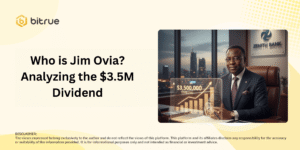
However, investors should remember that no stock is risk-free. The slight decline in profit before tax should serve as a reminder to monitor broader market conditions, regulatory developments, and currency risks that could affect future earnings.
Jim Ovia’s consistent dividends in past years—including over N25 billion for the full 2024 financial year—show that patient shareholders have been rewarded generously. But diversification remains key; relying solely on one bank’s dividends could expose investors to sector-specific risks like policy changes or economic downturns.
Building Wealth Through Dividends and Diversification
Long-term investors may see Zenith Bank as a solid dividend stock, but it is wise to combine such holdings with other asset classes, including crypto or tokenised assets, to hedge against volatility. Platforms like Bitrue allow investors to track dividend-paying stocks and other yield-generating assets globally, offering valuable tools for portfolio diversification.
Jim Ovia’s $3.5 million dividend payout underscores Zenith Bank’s ability to deliver strong shareholder returns even in a challenging environment. The bank remains one of Nigeria’s most profitable institutions, with solid earnings growth and efficient risk management. Still, investors must be mindful of changing market conditions before making long-term decisions.
Zenith Bank’s example shows that dividends can be a powerful wealth-building tool, especially for committed shareholders like Jim Ovia.
FAQ: Jim Ovia and Zenith Bank Dividends
Who is Jim Ovia?
He is the founder and chairman of Zenith Bank and one of Nigeria’s wealthiest investors.
How much is his dividend payout?
He will earn about $3.5 million (N5.18 billion) from the interim dividend on his direct shares alone.
How is Zenith Bank performing in 2025?
The bank posted N2.5 trillion in gross earnings and N532 billion profit after tax, showing solid performance despite a dip in pre-tax profit.
Is Zenith Bank’s dividend sustainable?
Yes, its strong capital adequacy ratio and liquidity levels suggest it can maintain regular payouts, though investors should monitor market conditions.

